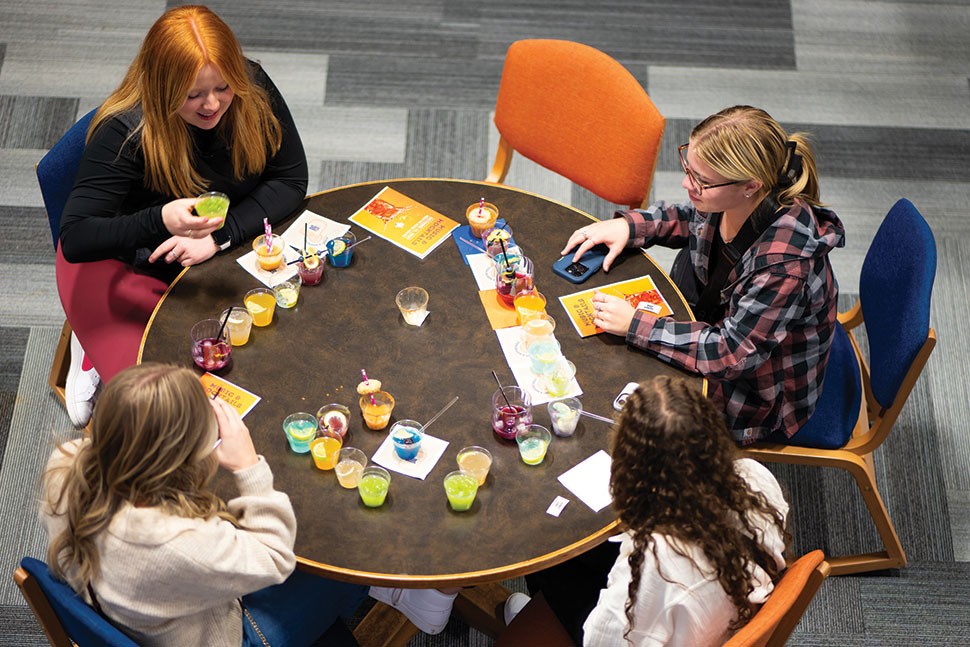Spirit-Free Spaces

Alcohol-free events have gained significant traction in recent years. It’s a trend reflected in the growing popularity of wellness challenges like Dry January, a time when millions of people abstain from alcohol at the start of a new year.
In response, several public libraries around the country are now providing adults-only, sober-curious programming to educate attendees on making alcohol-free mixed drinks, often called mocktails or sober cocktails.
“Coming out of COVID, there were a lot of people [who said], ‘I want to get healthier, I want to feel better,’ and they tried a sober month,” says Wendy Wendt, director of Grand Forks (N. Dak.) Public Library (GFPL), which hosted its second annual Music and Mocktails event in October 2023. “Now [they’re] looking for more opportunities to just do things alcohol-free.”
In a 2020 survey of US adults from the National Library of Medicine, nearly two-thirds of more than 800 participants said their alcohol consumption had increased compared with their consumption rates before the pandemic, mainly because of higher stress, more alcohol availability at home, and boredom. But in a 2023 Nielsen survey, 34% of Americans reported trying to cut back on drinking, and 24% responded that they live an alcohol-free lifestyle.
The past few years have led to “a whole way of looking at life,” says Wendt, and library workers have provided support. For those who organize these events, they say that such programming has promoted inclusion, helped those in recovery, and further established the library as a safe place to socialize.
Masterful mocktails
In March 2023, Sewickley (Pa.) Library (SL) worked with local bar Harold’s Haunt, which offers alcohol-free drinks on its regular menu, to host a master class in sober mixology.
The bar manager at Harold’s Haunt demonstrated how to create four concoctions: the Belenus Chariot, featuring grapefruit and rosemary; hibiscus tea–based Allure of Adonis; Pomona’s Harvest, including orange juice and sage; and Baymax, a fizzy mocktail with lime, sage, and orange bitters. The manager shared professional insights on flavor profiles, drink constructions, herbal characteristics, and more.
“This isn’t just a Shirley Temple,” says Emily Fear, SL librarian and program organizer. “These are beautifully crafted, very thoughtful, and delicious drinks.”
GFPL introduced its Music and Mocktails program in 2022 as part of a broader effort to support more health and wellness initiatives. Spearheaded by Grand Forks Public Friends (GFPF), the program has showcased mocktails created by local organizations and businesses that compete for the title of Master of the Mocktail. Attendees pay $10 to sample contenders’ creations and vote for their favorite drink while listening to live music from local bands. The event cost $2,700 to host and was covered by GFPF.
“This event is a blast, both for attendees and us as planners,” Wendt says. “Everybody wins.”
A ‘third place’
At Irvin L. Young Memorial Library (ILYML) in Whitewater, Wisconsin, Programming and Makerspace Librarian Sarah French is creating a spirit-free space for locals. French led a program in May 2023 with a $50 budget to demonstrate how to create three mocktails from books in the library’s collection—including a recipe for a Rhubarb Blush, featured in Zero Proof: 90 Nonalcoholic Recipes for Mindful Drinking by Elva Ramirez. French’s outreach methods, including advertising with University of Wisconsin–Whitewater’s library, attracted a broad age range.
“We’re in a college town and we’re in Wisconsin, which is known as a heavy drinking state,” French says, adding that students who attended the event noted that they were seeking activities not centered around alcohol.
Library staffers say mocktail events are already having a positive effect. “A woman [who came to our event] said she was having a hard time getting her husband out of the house,” French says. “Out of all the programs that we do here, this was the one that he was actually like, ‘I’d go to that.’”
SL’s program also included a discussion about the importance of individuals having sober options at restaurants and bars or during get-togethers. Nonalcoholic drinks can cater to the sober curious, those who don’t drink at all, those who are in recovery, or those who experience overstimulation or other mental health conditions when drinking, Fear notes.
Fear says: “Every one of these topics comes back to the fact that there just aren’t enough spaces for people who would like [to be] social without the need of some form of alcohol lubricant.”
Taking a shot
For librarians hosting mocktail programs on their own, the key is to practice making each drink before the event to help ensure the program runs smoothly, French advises. Practicing also provides an opportunity to confirm you have the right equipment, she adds, like cocktail shakers and muddlers.
Many bars and restaurants have alcohol-free cocktails on their menus, Fear notes, so initiating a partnership can be as simple as asking. “Don’t rule out bars and restaurants as potential program partners,” she says. “Getting a ‘yes’ can lead to greater benefits than even originally envisioned.”
While GFPL’s inaugural event incorporated educational materials and speakers about substance abuse, the second event’s focus expanded to a wider audience. “Mocktails aren’t just about recovery,” says GFPF Board Member Kaylee Cusack. “They’re about inclusivity. We want this to be more about bringing multiple parts of the community together.”
Source of Article